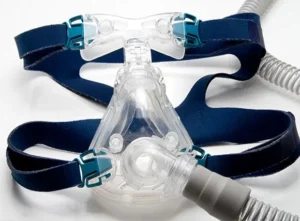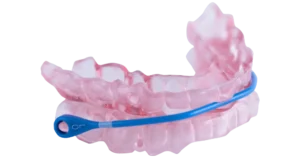Alternative to CPAP
CPAP VS. Oral Appliance Therapy
Let’s have a face-off between two sleep apnea treatment champions: the oral appliance and the CPAP machine! Both are powerful contenders, each with its own strengths and weaknesses.
CPAP Pros/Cons

Pros :
The CPAP machine is considered the gold standard for treating sleep apnea. It delivers a continuous flow of air, keeping your airway open throughout the night.
Whether you have mild, moderate, or severe sleep apnea, the CPAP machine can handle it all, providing tailored pressure settings.
Many modern CPAP machines come with built-in data tracking, allowing you and your healthcare provider to monitor your progress and treatment efficacy.
Cons:
Some people find wearing a mask and dealing with the tubes cumbersome and uncomfortable, leading to lower compliance rates.
The sensation of having a mask covering the nose, mouth, or both can trigger feelings of claustrophobia in some individuals, making it challenging to tolerate the CPAP therapy.
Improper mask fit or movement during sleep can lead to air leakage, reducing the effectiveness of the therapy and potentially disrupting sleep.
The continuous flow of air from the CPAP machine can cause dryness or congestion in the nasal passages, leading to discomfort.
The noise and presence of the CPAP machine may disturb the sleep of a bed partner, especially if they are sensitive to sound or the movement of the mask during the night.
Here in the PWN, we are no strangers to power outages! The gentle humming noise and dependence on electricity might bother light sleepers or those who prefer a quieter sleep environment.
The CPAP machine is bulkier and requires access to electricity, making it less convenient for travel or camping.
Oral Appliance Pros/Cons

Pros :
The oral appliance is like slipping on a custom-made mouthguard. It’s compact, easy to carry around, and requires no electricity, making it ideal for travel or camping adventures.
Unlike the CPAP machine, which involves wearing a mask and dealing with tubes, the oral appliance is simple and straightforward to use. You just pop it into your mouth before bedtime, and you’re good to go.
Unlike the CPAP machine with its gentle
whooshing sound, the oral appliance operates in blissful silence, ensuring a peaceful night for both you and your bed partner.
If you’re not a fan of masks and tubes, the oral appliance is the way to go. It’s non-invasive and simply adjusts the position of your jaw to keep your airway open.
The oral appliance doesn’t need a power source, making it suitable for those who may not have consistent access to electricity, such as during power outages or remote locations.
Many people find the oral appliance more comfortable to wear, leading to better compliance and long-term use.
Cons:
While highly effective for mild to moderate sleep apnea, the oral appliance might not be the best fit for severe cases.
Proper fitting and adjustments are crucial, and this therapy demands close collaboration with a qualified dentist or sleep specialist.
Some users might experience mild jaw discomfort, which can usually be resolved with adjustments.
So, there you have it, a showdown between the oral appliance and the CPAP machine. The winner depends on your personal preferences, the severity of your sleep apnea, and how well each option fits into your lifestyle. Call us today and schedule a consultation to determine if oral appliance therapy is right for you!
CPAP not working?
CPAP isn’t working properly?
You aren’t by yourself. Approximately 83 percent of CPAP users stop using it or are inconsistent with their use. Patients who cannot tolerate CPAP do not use it.
This is known as CPAP intolerance or CPAP failure.
Issues beyond your control are frequently the cause of CPAP failure:
- Seasonal allergies or ongoing congestion
- Nasal, sinus or upper palate issues (such as a deviated septum)
- Skin irritation on face
- Nasal irritation, dryness or bleeding
- Claustrophobia or sensation of suffocation
- Respiratory infections
- Abdominal bloating & gas
- Machine disturbs sleep (or partner’s sleep)

Do you dislike flying with CPAP?
Additional Stress
Travel, whether for pleasure or for business, may be stressful. Traveling with a CPAP machine adds to the hassle. Come and talk with us at our office at Sleep Advantage WAlocated Arlington, WA so we can discuss the alternative to CPAP.
Traveling with a CPAP can be difficult due to the added weight of the machine and the difficulty passing through security checkpoints.
Additional Challenges
You’ll also need distilled or deionized water for your humidifier once you get at your location.
Then cross your fingers that an electrical outlet is close by. You’ll also need the appropriate adaptor if traveling internationally.
Additional Failure
When traveling in adverse weather or to isolated locations, electricity reliability might be a challenge. In these situations, you must decide whether to take a backup battery or not.
This also leads to a higher rate of failure or non-compliance.
Oral Appliances are portable.
See How Simple It Is!
It’s an easy process. Each oral appliance is custom made to fit you perfectly and comfortably. Come in for a consultation first, and we’ll figure out if this is the best option for you. If it is we’ll,
First, we’ll work with your insurer for any coverage you may have.
Second, your new oral appliance will be custom made and fitted.
Finally, you’ll sleep easy with no mask, no hose, just sleep!
